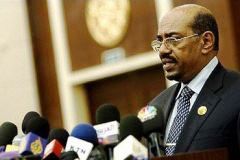Sudan pledges peace in Darfur, renews opposition to UN force
Mar 20, 2006 (NAIROBI) — Sudanese President Omar al-Beshir on Monday said he was determined to clinch lasting peace in Darfur and renewed his rejection of foreign intervention in the war-torn western region.
 A day after UN Secretary General Kofi Annan urged Khartoum to cooperate in the handover of peacekeeping duties as security deteriorates in Darfur region, Beshir said African forces were well placed to restore stability there.
A day after UN Secretary General Kofi Annan urged Khartoum to cooperate in the handover of peacekeeping duties as security deteriorates in Darfur region, Beshir said African forces were well placed to restore stability there.
“We reiterate our determination and keenness to achieve a lasting and comprehensive peace in Darfur through direct negotiations with the rebels to stop the bloodshed and killing of women, children and elderly people,” Beshir Museveni told a summit of the east African, seven-nation Intergovernmental Authority on Development (IGAD).
Beshir said Khartoum was ready to assist African Union forces operating in Darfur, where clashes between government-backed militia and rebels from minority tribes has claimed some hundreds of thousands of lives and displaced millions others.
Early this month, the AU agreed in principle to hand over its cash-strapped peacekeeping mission in Darfur to the United Nations, despite spirited resistance from Khartoum, which argued that the deployment would worsen the situation.
“The success of an African Union mission is a success for Africa and testimony of their ability to achieve peace and stability in the region without foreign intervention.
“It is out of this conviction that the Sudan has declared its commitment to support the AU forces and its clear rejection to any form of foreign intervention in the country. We have witnessed and experienced what happened in Iraq and Afghanistan and lessons learnt that shouldn’t be repeated in the African continent,” he said.
War in Darfur broke out in February 2003, when black ethnic groups launched a rebellion against Khartoum that was brutally repressed by the Arab Islamist regime of Beshir. Both sides have been accused of violating a truce that was signed in April 2004.
The combined effect of the war and one of the world’s worst humanitarian crises has left up to 300,000 people dead and an estimated 2.4 million displaced.
The 7,000-strong African Union, which was deployed in 2004, has been suffering from poor funding and inadequate resources to contain the escalating bloodshed in Sudan’s western region.
The United States has been lobbying for the sending of a new UN-led force, backed by NATO, and probably double the current AU deployment, to take over peacekeeping in Darfur despite Khartoum’s opposition.
(ST/AFP)
